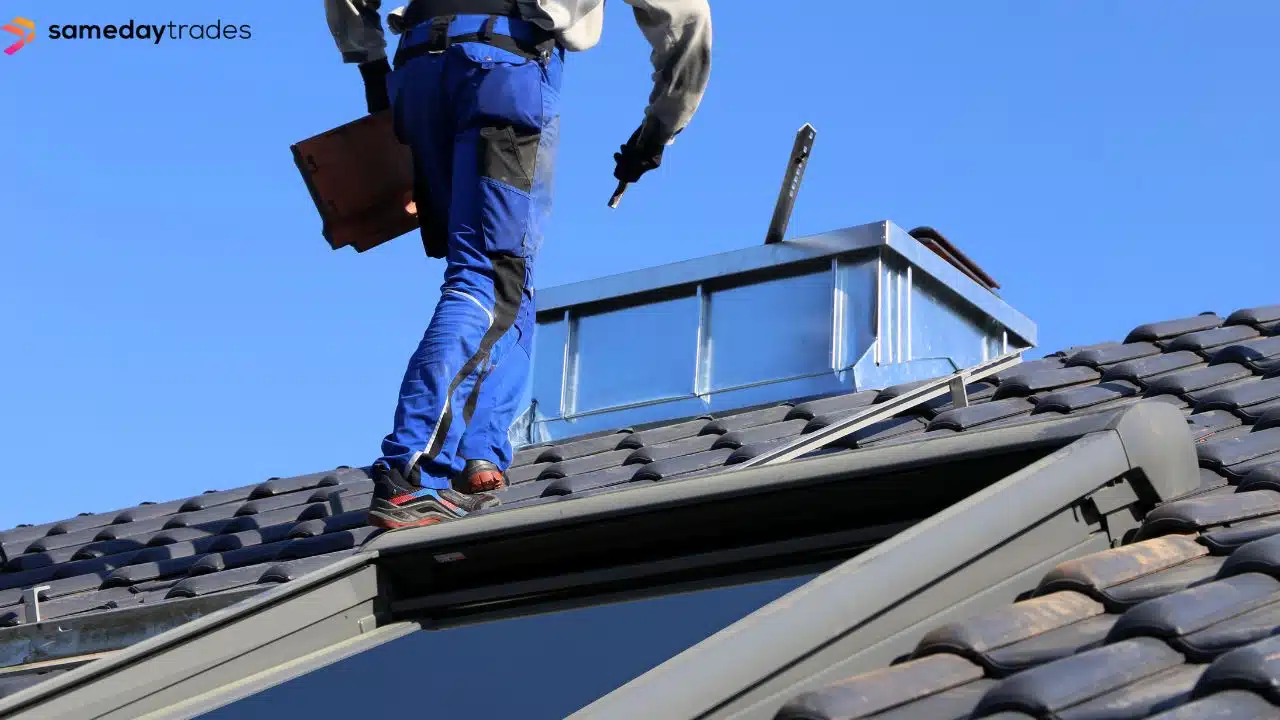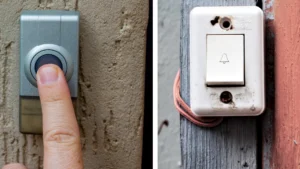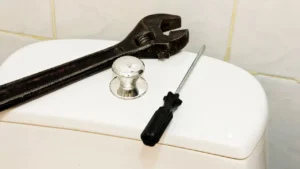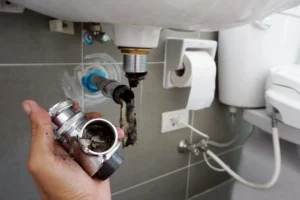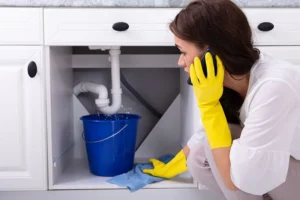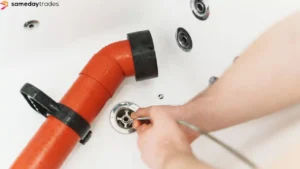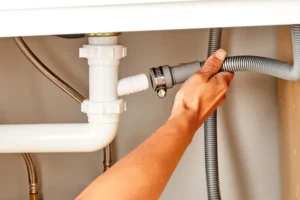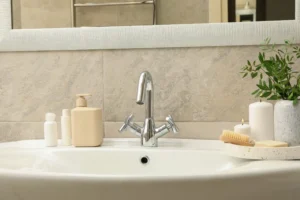Leaky roofs and clogged gutters can turn into nightmares fast. Roof plumbers are the pros who handle these issues by managing roof drainage systems like gutters, downpipes, and rainwater tanks.
This article will answer the big question: “What Do Roof Plumbers Do?” and show when you might need their help. Keep reading to protect your home from water damage!
Roles and Responsibilities of a Roof Plumber
A roof plumber handles all things related to rooftop water systems. From keeping stormwater under control to managing rainwater collection, they protect your home from leaks and damage.
Installation and maintenance of gutters and downpipes
Gutters and downpipes catch rainwater and guide it away from roofs. Roof plumbers cut, shape, and install these using strong materials like aluminium or galvanised steel. They also add gutter guards to stop dirt, leaves, or debris from clogging the system.
Without proper setup, water can overflow, leading to mould growth or damaging walls.
Maintenance includes fixing cracks or sealing leaks in old gutters. Rusty parts may need replacing to prevent backflow issues during storms. Regular cleaning is key for storm water drainage systems to work well.
Preventive maintenance saves time and reduces costly repairs later on rooftops.
Repair and management of roof drainage systems
Blocked or broken downpipes can lead to standing water and leaks. Roof plumbers fix these issues to keep stormwater systems working properly. They replace damaged parts, clear clogs, and repair joints if needed.
Regular inspections help spot problems early before they cause major damage.
Plumbers understand how wind, heat, and cold affect water flow on roofing materials like shingles or metal roofs. This knowledge ensures rainwater management is smooth during all weather conditions.
A proper drainage system also prevents mould growth in ceilings and walls caused by trapped moisture.
Installation of flashings and rainwater tanks
Flashings protect your roof from leaks around vent pipes, skylights, chimneys, and other fixtures. Roof plumbers install these metal strips carefully to block water entry. Poor flashing can lead to mould growth and costly repairs over time.
Rainwater tanks collect harvested rainwater for flushing toilets or irrigation. These tanks also reduce dependence on municipal water supplies during droughts. A first-flush diverter is often added to filter out debris before storage.
Next up: When should you call a roof plumber?
When to Call a Roof Plumber
Got water dripping where it shouldn’t? A roof plumber can fix the issue before things spiral out of hand.
Identifying leaks or water damage
Leaks can show up as water stains on ceilings or walls. Left unchecked, this can lead to mould growth or rotting wood. Cracked concrete and sagging roofs may also signal water damage.
Roof plumbers fix these problems before they worsen.
A leaky roof often lets in more than just rain—it invites trouble. Storm water drains might overflow if blocked by debris, worsening leaks during heavy rains. Calling a professional plumber prevents bigger issues like damaged guttering or failed plumbing systems.
Regular inspections every 2-3 years help spot early signs of trouble and protect your home’s structure.
Installing or upgrading roof drainage systems
Roof plumbers handle roof drainage systems to manage rainwater effectively. They assess old gutters, downpipes, and sewers for blockages or damage. If needed, they upgrade the system, replacing rusted parts or adding new components like first flush diverters.
These upgrades prevent water from pooling on the roof and leaking into your home.
They also install rainwater harvesting systems for conserving water during dry spells. This process includes cleaning roofs and gutters to remove debris and fitting filtration devices.
By adding storage tanks, a plumber helps collect clean rainwater for reuse. Upgraded drainage stops mould growth indoors and protects your home’s structure over time.
The Difference Between a Roof Plumber and a Roofer
Certainly! Here’s the section on “The Difference Between a Roof Plumber and a Roofer,” formatted in HTML Table and following all your strict guidelines:
The terms “roof plumber” and “roofer” might seem similar, but their roles differ significantly. The table below highlights the contrasts:
| Aspect | Roof Plumber | Roofer |
|---|---|---|
| Main Role | Focuses on roof drainage systems. Installs and maintains gutters, downpipes, and flashings. | Handles general roof work. This includes installing, repairing, and replacing roof materials. |
| Specialisation | Trained and licensed specifically for water drainage related to roofs. | May or may not have formal licensing. Can specialise in roof tiling or metal roofing. |
| Tasks Involved | Interprets technical drawings. Solves water flow problems. Installs rainwater tanks. | Works with roof coverings like tiles, shingles, and metal sheets. |
| Legal Requirements | In Australia, they must have certification/license to work on drainage systems. | No legal requirement for licensing in all cases, depending on tasks. |
| Common Tools | Uses pipe cutters, welding equipment, and spirit levels for precision drainage work. | Uses hammers, nail guns, and tile cutters for roofing installations. |
| Example Scenario | Called to repair a leaking gutter or manage stormwater systems. | Hired to replace damaged roof tiles after a hailstorm. |
Understanding who to call can save time and headaches. Next, let’s look at when you might need a roof plumber specifically.—
Conclusion
Roof plumbers play a big role in keeping homes safe and dry. From fixing leaks to setting up rainwater tanks, their work protects your property from water damage. If you spot drips or blocked gutters, it’s time to call one.
A licensed roof plumber makes a real difference, saving money and headaches down the track. Don’t wait for mould to creep in—act fast!
Also Read this : GUIDE TO HIRING A ROOF PLUMBER IN ADELAIDE
FAQs
What does a roof plumber do?
A roof plumber works on water pipes, rainwater collection systems, and ventilation systems. They help with installations, repairs, and ensuring proper water flow in constructions.
When should I call a roof plumber?
Call one if you notice leaks, mold growth, or issues with your rainwater harvesting system. They also assist during new builds or renovations.
How does a roof plumber support water conservation?
They design systems for rainwater harvesting and improve internal plumbing to reduce waste. This helps tackle water scarcity in sustainable building projects.
Can roof plumbers work on more than roofs?
Yes! Besides roofs, they handle internal plumbing connected to the water supply and ensure safety measures are followed across various tasks.

